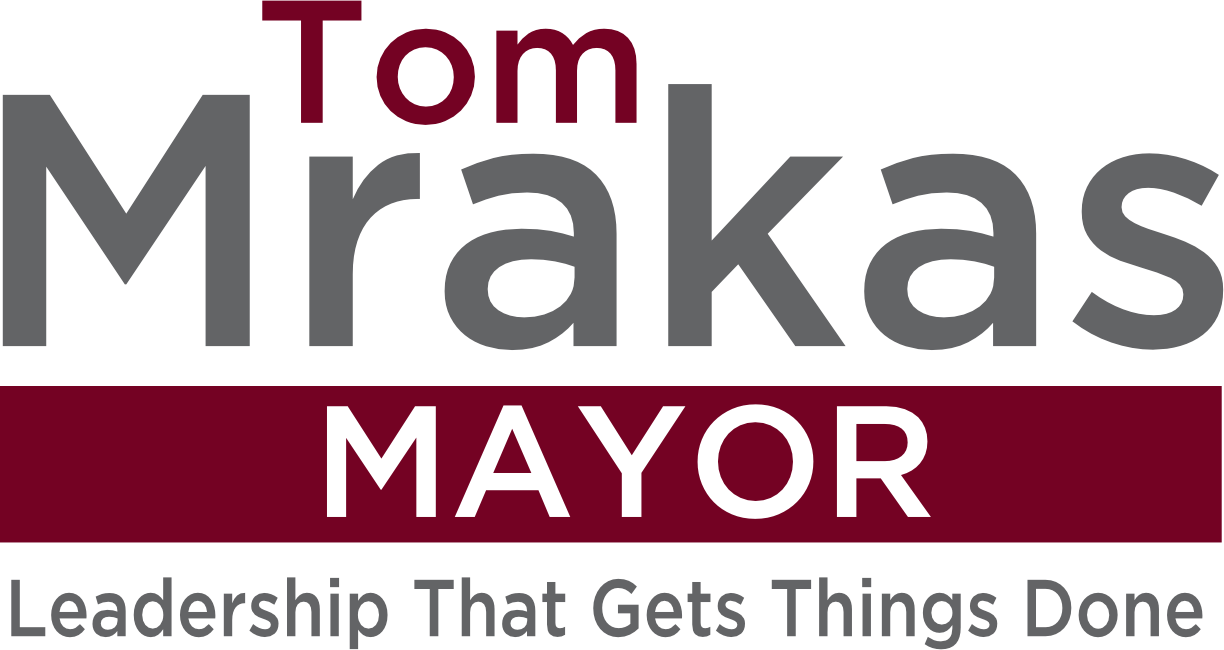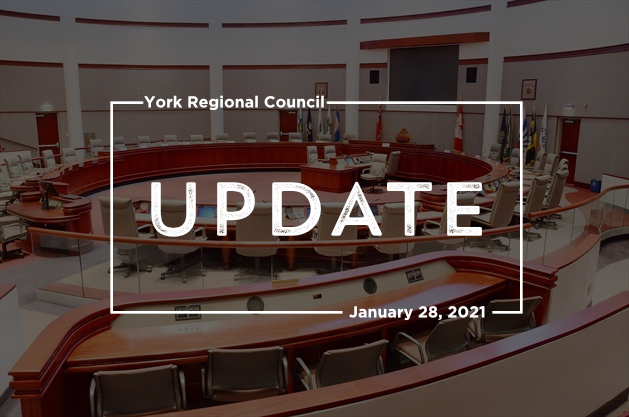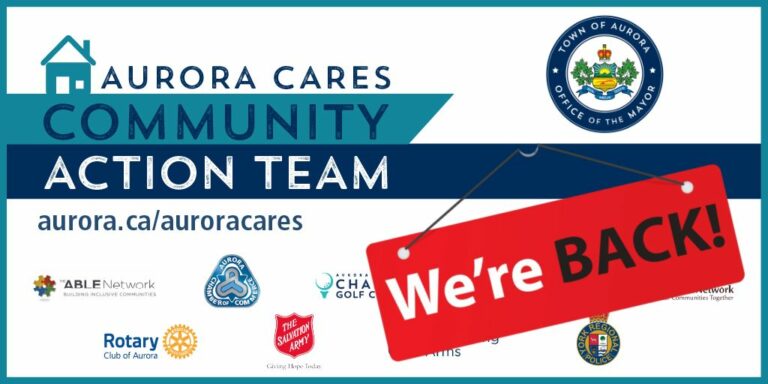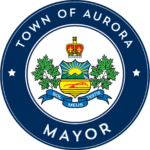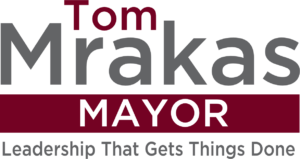York Region’s continued response to COVID-19
York Regional Council received an update on the continuing response to COVID-19 and actions taken to prevent the spread of the virus within our communities.
On January 12, 2021, the Government of Ontario declared a second provincial state of emergency under section 7.0.1 (1) of the Emergency Management and Civil Protection Act (EMPCA) which includes a stay-at-home order, additional public health and workplace safety measures and the suspension on in-class learning for students in hot-spot regions, including York Region, until February 10, 2021, at the earliest.
Case and contact management, outbreak management, assessment centre testing and key public health measures implemented in 2020 remain top priorities in York Region’s on-going response to COVID-19 in 2021.
Community settings continue to be a source of spread for the virus and a growing number of cases are acquired from unknown community locations and exposure. Of equal concern is an increase of confirmed cases of COVID-19 variants attributed to community spread.
For these reasons, Regional Council advises residents to continue following the advice of Public Health, including staying home as much as possible and limiting contact with anyone outside the immediate household.
To further protect residents from increasingly contagious variants of the virus, Regional Council has called on the federal government to implement greater travel restrictions including the prohibition of travel from countries with high volumes of COVID-19 variants and mandatory testing requirements upon arrival in Canada for all passengers on international flights.
Regional Council also received an update on the provincial government’s plans for vaccine distribution. As of January 21, 2021, York Region Public Health has successfully provided first-dose vaccines to all residents in long-term care and high-risk retirement homes who consented to COVID-19 immunization. As vaccine supply increases, residents in high-risk congregate settings will also receive immunizations.
York Region Public Health continues to actively prepare for a large-scale mass immunization. Combined with public health measures the COVID-19 vaccine will be an important tool to help stop the spread of the virus as the population becomes immunized.
Regional Council remains committed to supporting strong, caring and safe communities. Throughout this crisis, York Region has maintained york.ca/covid19 as a trusted source of information related to public health and safety.
Regional staff will continue to monitor community needs and their impact on Regional programs and services and provide updates to Regional Council and the community on the on-going response.
Financial Impacts of COVID-19
The financial concerns of COVID-19 continue to impact York Region. Up to December 31, 2020, the weekly affect averaged $3.7 million or $158 million for the year-to-date. Funding received from senior levels of government total $91 million, leaving a net impact of $67 for the Region.
Projections for COVID-19’s effects on 2021 are $183 million. This is higher than the December projection due to provincial announcements regarding additional funding for social services. This figure also represents expected results from deferred water and wastewater rate increases for 2021.
The Region continues to offset the financial impacts of COVID-19 through a number of strategies, including the use of existing resources, deferring non-essential activities and senior government funding which is estimated to be approximately 37.5 million in 2021. Additional details on expected financial impacts and mitigation strategies will be reflected in the Regional budget which will be tabled on February 25, 2021.
Continuing to support small businesses during the pandemic
Municipalities across Ontario can now establish an Optional Small Business Subclass to provide tax relief to small businesses who own their property and mitigate financial pressures of COVID-19. This subclass will be conditional on the creation of a new regulation under the Assessment Act.
York Region is home to approximately 54,000 businesses and work is underway to define eligibility criteria for the subclass, identify properties most negatively impacted by the pandemic and determine the discount in a way that best meets local needs and priorities.
Additionally, commercial and industrial education property taxes will also reduce to 0.88% across the province, saving York Region businesses approximately $12.4 million.
Information on the Optional Small Business Subclass will be made available in the coming months at yorklink.ca, complementing numerous federal and provincial funding supports for all businesses.
York Region Environmental Services Director awarded Top Public Works Leader of the Year
York Region Director of Environmental Promotion and Protection Laura McDowell has been recognized by the Ontario Public Works Association as Public Works Leader of the Year. This award celebrates outstanding career service achievements for individual public works professionals and officials.
Ms. McDowell’s distinguished career in public service with York Region has spanned more than 20 years and has culminated in delivering leading waste initiatives, safe and reliable water and sustainable forestry services to York Region’s 1.2 million residents.
Regional Council extended congratulations on this achievement.
Moving towards a greener future
Regional Council endorsed staff comments to the Ministry of Environment, Conservation and Parks’ proposed regulation to make producers responsible for Blue Box programs.
In collaboration with York Region’s nine cities and towns, comments and feedback include:
- A province-wide common collection system with an expanded list of designated materials
- Expansion of eligible collection sources to include parks, public spaces, schools and long-term care facilities
- Establishment of performance targets and material subcategories to promote continuous improvement
- Maintained curbside collection frequency and depot collection to ensure convenient access to services
As leader in waste diversion, York Region and its local municipal partners have advocated for producer responsibility for the Blue Box Program and other diversion programs for many years. In June 2020, Regional Council endorsed a resolution for the Region and local cities and towns to transition to producer responsibility together in 2025. This aligns with comments on the Draft Blue Box Regulation and provincial amendments to the Food and Organic Waste Policy statement and support the Region’s recommendations on the federal discussion paper on a proposed approach to management and plastics.
The paper outlines a three-pronged approach including banning or restricting certain single-use plastics by the end of 2021, establishing recycled content requirements and working with provinces and territories to develop consistent national targets, standards and regulations for extended producer responsibility and aligns with York Region’s goal to move towards a circular economy. The following recommendations also address the potential impact on the Region’s integrated waste management system:
- Green bin compostable standards should be developed to ensure compatibility with existing infrastructure, including both aerobic and anerobic processing
- Producers of items intended to be recovered through Green Bin programs should be required to ensure products align with requirements of most existing programs before labelling or advertising their products as compostable or flushable
- Minimum recycled content requirements from specific product types should be applied to provide the most effective support for recycling markets
- Accessibility for Ontarians with Disabilities Act considerations should be addressed through consultation with impacted communities; certain products like straws and potentially other items can be vital to communities with mobility or physical ability challenges
York Region will remain engaged with officials at all levels of government to continue moving toward a greener future with progressive waste diversion programs.
Upper York Sewage Solutions Individual Environmental Assessment Approval Status Update
Regional Council received an update on the Upper York Sewage Solutions (UYSS) Environmental Assessment and subsequent information related to a possible alternative solution proposed (link to Minister letter) by the Ontario government.
York Region continues to advance discussions with the Province of Ontario and Durham Region to support the UYSS Environmental Assessment as the preferred solution for wastewater service to accommodate approved growth (approximately 153,000 people and workers) in the Towns of Aurora, Newmarket and East Gwillimbury.
The update to Council also includes a project timeline summary, beginning with the initial submission in 2014, Ministry Review and the outcome of Crown’s Duty to Consult obligation with Indigenous Peoples.
To date, approximately $100 million has been spent to advance this $628 million project. The remaining $475 million is part of the proposed 10-year plan to complete this project.
$1.4 billion is needed to build 4,130 supportive housing units in York Region
Regional Council received an update on York Region’s role in addressing supportive housing needs, including more than $1.4 billion required to build and operate an additional 4,130 units. An additional $25.7 million could be needed annually to fund rent subsidies to ensure these units are affordable to households with low income.
Supportive housing includes diverse housing, accommodation types and support models designed to enable people with developmental disabilities, serious mental illness and addictions to live in their communities as independently as possible.
While supportive housing is a provincial responsibility, the Region funds and administers community housing and homelessness and housing stability services.
While all initiatives that increase the supply of affordable housing in York Region are welcome, Regional investment should be guided by the Region’s Corporate Strategic Plan and 10-year housing and homelessness plan, support key Regional housing objectives and align to the Region’s scope and mandate.
Exploring innovative housing options to support affordable housing
Housing is a fundamental need that supports positive health and social outcomes and connects residents to the economy, transportation systems and community services. To help address the need for affordable housing across the Region, Regional Council endorsed a suite of innovative approaches and policies to increase housing options.
These strategies, which look beyond traditional housing designs and single-family units, aim to encourage timely delivery of more affordable housing and increase partnerships with other levels of government, developers, financial institutions and non-profit housing providers.
The strategies are organized into four Classifications of Innovations:
- Built Form and Diversifying the Housing Stock, including live/work units, micro suits, tiny houses and multi-generational housing
- Innovations in Design and Construction, such as green and timber buildings, modular construction or container housing
- Municipal Programs to waive or differ development charges, protect rental housing and open publicly owned lands to affordable development
- Process Improvements and Financial Tools to expediate approval processes, implement lease-to-own policies or financing opportunities
The Region will continue to work with key stakeholders, including local municipalities and the development industry, to find affordable housing options for current and future residents. Housing-related policies will be updated through the Municipal Comprehensive Review to conform with provincial policy direction and support future work.
Train whistles to stop at the rail crossing on Ninth Line on the Stouffville GO corridor
York Regional Council approved whistle cessation at the rail crossing on Ninth Line on the Stouffville GO corridor in the City of Markham. This is consistent with the Region’s Anti-Whistling Warrant Criteria Policy at Regional rail crossings to reduce noise to nearby neighbourhoods.
Currently there are six Regional locations where whistle cessations have been implemented in the City of Markham.
York Region and the nine cities and towns are responsible for fulfilling requirements of the Region’s Anti-Whistling Warrant Criteria Policy and Transport Canada’s Railway Safety Act to implement whistling cessation. The City of Markham will implement the required safety features to accommodate whistle cessation. Implementation of these are anticipated to be complete in 2021.
Emergency Management Annual Compliance Review
Regional Council received the Emergency Management Program Annual Compliance Review outlining activities undertaken to ensure compliance.
Under the Emergency Management and Civil Protection Act and Ontario Regulation 380/04, York Region is required to create and maintain an emergency management program and emergency response plan, identify critical infrastructure and promote public awareness.
In 2020, the provincial Office of the Fire Marshal and Emergency Management waived the requirement for an emergency exercise in recognition of the on-going response to COVID-19. Investments in emergency preparedness, planning, training, public education and business continuity planning have provided York Region the foundation to meet the challenges associated with the pandemic while continuing to deliver essential programs and services.
In 2020, York Region partnered with York Regional Police and the nine cities and towns to complete the annual Hazard Identification and Risk Assessment (HIRA). Top hazards identified through this exercise and most likely to impact York Region include:
- Infectious Disease
- Electrical Energy Outage
- Winter Weather
- Cyber Attack
- Flood
- Water/Wastewater Disruption
Residents can continue to do their part by staying home, following public health advice and preparing a personal emergency plan and 72-hour emergency kit.
Bell Let’s Talk Day
Regional Council and York Region staff acknowledged Bell Let’s Talk Day through a series of virtual conversations and activities to raise awareness about mental health and well-being.
In light of the personal challenges associated with the COVID-19 global pandemic, ending the stigma associated with mental health has never been more important. In addition to a series of wellness supports available to residents, York Region has also launched the #YRStayConnected campaign to inspire residents to reach out and connect with others in a variety of ways.
Since 2011, the Bell Let’s Talk campaign has supported millions of Canadians in accessing mental health care and generated more than $100 million for mental health initiatives across the country.
York Region named a top employer
York Region has been named one of Canada’s Best Employers for 2021 by Forbes and Statista Inc.
Forbes and Statista identified 300 companies in their annual ranking of Canada’s best employers, with York Region ranking in the top 55% and top 25 of all government service employers in the country.
The Region’s innovative programs and initiatives regularly earn a top spot in annual rankings of top employers, with recent recognition as a 2020 GTA Top Employer, one of Canada’s Greenest Employers, one of Canada’s Best Diversity Employers and a Top Employer for Young People.
Police Services Board welcomes Norma McCullough
Regional Council appointed Ms. Norma McCullough for a two-year term with the York Regional Police Services Board commencing January 1, 2021.
Ms. McCullough joins the York Regional Police Services Board with a background in correctional services and law enforcement and extensive experience working with diverse communities.
Regional Council looks forward to working with Ms. McCullough to help York Regional Police advance its mandate to serve and protect York Region’s 1.2 million residents.
Celebrating Black History Month
Regional Council recognizes February as Black History Month and acknowledge the contributions of all Black Canadians who continue to shape Canadian society and culture.
Black History Month is an opportunity to learn about the diversity of Black communities in York Region and to celebrate the important contributions of Black Canadians to the settlement, growth and prosperity of the country.
Honouring lives lost on first anniversary of Ukraine flight 752 crash
On January, 8, 2021, Regional Council honoured the 176 lives lost, including 57 Canadians, 26 York Region residents and a member of the York Region family, Bahareh Karami, on the first anniversary of the Ukraine International Airlines flight 752 crash.
Offering deepest condolences to all who lost family, friends and loved ones in this tragedy, Council acknowledged the significant impact this horrific event has had on the country, community and York Region staff.
In honour and remembrance of their lives lost on Ukraine flight 752, flags at York Region’s administrative centre were lowered to half-mast on January 8, 2021.
New year and new look for York Region Matters
York Region Matters has been delivered to mailboxes across York Region and the newsletter is brighter and bolder than ever before. This edition features timely news and information including:
- Taking care of yourself during COVID-19
- Participating in York Region’s Municipal Comprehensive Review
- Learning more about York University’s new campus
- Understanding services available at 17150 Yonge Street
The most recent edition of the newsletter is available at york.ca/yorkregionmatters
Census data supports communities
In May 2021, the Government of Canada will launch the 2021 Census as an online questionnaire in response to the on-going COVID-19 pandemic. Key socio-economic and census data is critical to decisions and policies that have a direct impact on residents, neighbourhoods, communities and businesses.
In support of the essential data collected through the Census, Regional Council passed a resolution in support of the 2021 Census and encourages all residents to complete their questionnaire online at census.gc.ca
To safely administer the 2021 Census, Statistics Canada will hire approximately 32,000 people across the country to assist with data collection. Individuals can apply for these positions through the Statistics Canada job site.
Alzheimer’s Awareness Month
Regional Council recognizes January as Alzheimer’s Awareness Month and encourages residents and organizations to learn more about dementia and its impact on individuals and families.
Through York Region’s Adult Day Programs, vulnerable residents suffering from dementia and other cognitive health issues are provided a safe and secure environment to participate in meaningful daily activities and exercises. While these programs have been suspended due to COVID-19, York Region continues to provide critical support to residents living with dementia and their family and caregivers virtually.
Crime Stoppers Month
Regional Council recognizes January as Crime Stoppers Awareness Month. Crime Stoppers of York region is a not-for-profit organization that partners with police and the media to keep residents and communities safe. As a leader among North American programs, Crime Stoppers of York Region is committed to fostering public trust while facilitating the gathering of anonymous information to help police solve crimes.
National Non-Smoking Week
Regional Council recognized January 17 to 23, 2021 as National Non-Smoking Week.
The National Non-Smoking Week campaign aims to educate residents on the dangers of smoking, help people quit and assist in the goal of a smoke-free Canada. York Region Public Health provides a number of cost-free smoking cessation programs and resources online at york.ca/substanceuse
International Day of Education
Regional Council recognized January 25, 2021 as International Day of Education. This United Nations awareness day provides an opportunity to celebrate learning in all contexts and look to innovations that fulfill the potential of every learner.
As a result of the COVID-19 global pandemic, schools, universities, colleges and other learning institutions across the world have been forced to close and move learning to a virtual environment. In response to this shift in learning, the 2021 International Day of Education focused on continued collaboration and transformation that puts education and lifelong learning at the centre of world-wide recovery.
